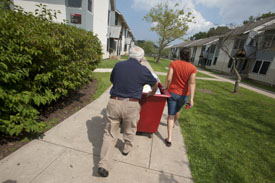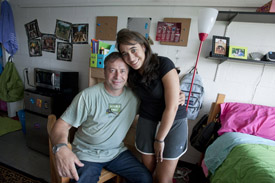Parent-child bond changes as college career begins, Rutgers experts caution
When a child starts college, there’s “an eruption of uncertainty’’ for both student and parent, according to Jennifer Tanner, a Rutgers professor who specializes in development and adjustment in young adults ages 18 to 29.
“Whatever relationships or ways of communicating that were in place before, all aspects are going to change, whether the student leaves the family home or not. The person is entering emerging adulthood, and one of the primary tasks is to renegotiate the relationship with parents,’’ says Tanner, a researcher with Rutgers' Institute for Health, Health Care Policy and Aging Research.
In many cases, children finally have some control over their bond with mom and dad, especially if they’re away at school. They can govern the amount of contact and -- in theory, at least -- manage their day-to-day lives with little help from guardians.
Parents, meanwhile, can focus more time on work, leisure, or other family members.
It’s a shift that can cause confusion and hurt feelings. “Sometimes, parents and kids will blame each other: ‘Why are you so different?’" Tanner says. “But it really has to do with development. Acknowledging this is helpful and takes the blame off of one person.’’
Since keeping in touch can get complicated when a young person starts school, both sides should establish ground rules, says Tanner. “It’s usually easier for parents to say, ‘How often is it reasonable for me to communicate with and how should I do it? Would you like to talk once a week?’ ’’ she suggests. “Or they can say, ‘If I don’t get a text from you in three days I’m going to get worried.’ ’’

If students are spending too much time calling or texting a parent, it can be a sign that they’re having a tough adjustment, says Michelle Jefferson, Dean of Students for Cook and Douglass Campuses.
“That can mean they’re not taking advantage of activities,’’ she says. Her advice? “Encourage them to join an organization or go to an event.’’
At summer orientation sessions for parents, Jefferson fields questions from concerned moms and dads, some of whom are shocked to discover that they won’t be sent their children’s grades. Under the Family Education Rights to Privacy Act, schools aren’t permitted to release a student’s educational information without written permission from students and their parents, Jefferson informs them.
Jefferson also talks to parents about how their children might change. For instance, an early bird might morph into a night owl, she says.
“Most of them have a curfew at home. Usually 1 a.m. is about the latest. I explain to them how that at college, they’re in their room at 11 p.m. or so, but they’re probably getting ready to go out. They don’t come home until 2 or 3 a.m. and get up at 11, and they want to do the same thing at home.’’
According to Rutgers sociologist Patrick J. Carr, who has been studying transitions to adulthood for more

Smart phones, Skype, and social media make it possible for parents and children to stay in touch almost 24/7, blurring the sense of finality all parties might have felt 15 years ago, before cell phones became widespread, says Carr, one of the participating researchers in a landmark study, Coming of Age in America. He also co-edited a book by the same title. “When I went to school, you might have had one phone on a floor, or you had to walk a ways to use one. I wouldn’t talk to my parents for weeks on end. And their attitude was, no news is good news,’’ says Carr.
Although the so-called “helicopter parent,’’ used to describe an over-involved mom or dad who hovers over a child, has gotten a bad rap, Tanner and Carr believe these parents are in the minority. “We overblow the image of the lunatic fringe that has to manage everything,’’ Carr says. “What’s striking is how young people talk about their parents. They become partners in life. They’ll run decisions by their parents and get advice. Having that kind of relationship with your parents can only be a good thing.’’
Tanner says children of under-involved parents often have a tougher time.
“Those are the kids who don’t get care packages or visits. They look around them and realize, I missed something important. Friendships and intimate relationships are much harder when you don’t have a guide. They have to deal with the question of ‘How do I create a family?’ ’’
For parents, an important part of adjusting to life without a child at home is finding enjoyable ways to spend the extra free time. “It gives parents a place to redistribute some of their own concern, focus and energy,’’ Tanner says. “If a parent can do something for his or her self, it benefits the adult child.”
Although the process of redefining the parent-child relationship isn’t always easy, it can yield big rewards. According to Tanner, the ultimate goal should be “mutuality.’
Adult children realize they have the potential to give as adults and parents can view their children as “ambassadors to a new generation,’’ whose separate identities are a source of pride and companionship, Tanner says. “The potential to learn from and enjoy one another enters a new stage that offers opportunities to love and respect the other for what is unique about the way they see the world.’’